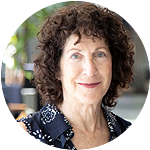Suzie Boss - Students to the Rescue: Deeper Learning through Real-World Projects
Nicholas Carlisle - Solution Team® Training
Meghan Hargrave - Taking Literacy Instruction from Good to Great: Research-Based Best Practices that will Lift the Level of Whole Group, Small Group and 1-on-1 Instruction and are Sure to Maximize Student Independence and Skill Transference
Matt Harris & Sian Jorgensen - Bootcamp for New and Aspiring Safeguarding Leaders
Jennifer D. Klein - Designing Learning Experiences for Cognitive and Cultural Inclusion through The Landscape Model of Learning
Cathy Berger Kaye - Enlivening Service Learning for Global Citizenship
Accreditation (ACS-WASC)
Serving as a Visiting Committee Member and Conducting a Self-Study
Presented by Marilyn George
Please register with Sylvia Taylor at: staylor@acswasc.org OR phone 650-235-8621.

SUZIE BOSS
Title: Students to the Rescue: Deeper Learning through Real-World Projects
Description: Real-world problems seldom fit neatly into content silos. Designing projects around challenges that students genuinely want to tackle leads naturally to interdisciplinary connections that deepen learning, increase engagement, and build students’ competence as creative problem solvers and contributors to their communities.
In this interactive pre-conference session, participants will analyze case studies in which students have addressed environmental and social concerns. Results range from reducing pollution in local watersheds to improving access to mental health resources to chronicling untold stories. Through such projects, students master both academic and non-academic competencies (such as collaboration, self-direction, and critical thinking), and reflect on their own growth as engaged citizens.
The pandemic, increasing severity of climate-related disasters, and persistent economic challenges have shown us the urgency of preparing all students to be problem solvers who can adapt to a fast-changing world. To be prepared to survive and thrive, students need to develop their capacity for both problem seeking and problem solving. Students develop these essential competences over time through developmentally appropriate experiences with authentic problem solving.
Participants will expand their toolkit of strategies to apply in their own contexts, including:
-How to identify students’ interests and concerns that are “project worthy” and developmentally appropriate
-How to ensure that projects address meaningful academic content
-How to use formative assessment to help students reach learning goals
In addition, the session will highlight strategies to overcome potential roadblocks to authentic projects, such as:
-How to leverage existing resources to build teachers’ confidence to design, manage, and assess projects
-How to expand opportunities for cross-disciplinary project planning
-How to connect beyond the classroom with community experts and allies
For school leaders and instructional coaches, this session will also show how an emphasis on real-world problem solving aligns with schoolwide practices such as graduate profiles, student-led conferences, performance assessments, PLCs, and portfolio defenses.
- - - - - - - - -

NICHOLAS CARLISLE
Title: Solution Team® Training
Description: Student bullying and cyberbullying are some of the most painful and intractable challenges facing educators today. Bullying causes real suffering and without intervention can result in lives lost or forever changed. Students who are different, e.g. because of their ability, ethnicity, socio-economic status or simply because they don’t follow stereotypical gender norms, are particularly vulnerable. Most teachers and school leaders have never been trained in an effective system for how to respond.
Solution Team® gives teachers and school leaders an effective solution to bullying. Educators trained in Solution Team® bring together the bullying students with three to four prosocial students and activate their empathy to end the bullying of one of their peers. Schools that use Solution Team® are able to solve 90% of incidents, making this one of the most impactful anti-bullying interventions available. Over time Solution Team® helps schools to develop a culture where students are more trusting of adult intervention, more willing to seek help and demonstrate greater kindness to each other.
Get trained! This one-day training prepares key staff to be the school’s Solution Coaches, ready to run a Solution Team® for any student that is referred to them and help students who are entrenched in the role of bully or target to change their ways. Participants will receive a copy of the Solution Coach® Handbook.
- - - - - - - - -

MARILYN GEORGE
Title: Serving as a Visiting Committee Member and Conducting a Self-Study
Description:This session will (1) prepare educators to serve on ACS WASC visiting committees, emphasizing the role and responsibilities of an ACS WASC visiting committee member, and (2) examine the essentials of the Focus on Learning process and its adaptability from a self-study perspective.
Who should attend?
- Representatives from schools conducting future Focus on Learning self-studies.
- All interested teachers and other educators who have never served on an accreditation team or have served previously but are eager to learn more about serving on a Focus on Learning team.
- All teachers and other educators who are serving on Focus on Learning teams, if they have not participated in a recent training.
Why attend?
The session will provide an opportunity for educators…
- To strengthen their understanding of Focus on Learning process from a school self-study and visiting committee perspective.
- To understand how Focus on Learning can be integrated with other school initiatives such as strategic planning
- To examine strategies inherent in Focus on Learning that support the school’s assessment of student learning in relation to schoolwide learner outcomes and curricular objectives/standards.
- To become eligible to serve on visiting committees.
Date: Wednesday, March 22, 2023
Time: 8:30 AM – 4:30 PM
Please register with Sylvia Taylor at: staylor@acswasc.org OR phone 650-235-8621.
- - - - - - - - -

MEGHAN HARGRAVE
Title: Taking Literacy Instruction from Good to Great: Research-Based Best Practices that will Lift the Level of Whole Group, Small Group and 1-on-1 Instruction and are Sure to Maximize Student Independence and Skill Transference
Description: Over the past several years there has been a lot of noise and updated research in the teaching of reading. The Science of Reading movement, current publications and new teaching resources have pushed us all to reconsider the way we are teaching literacy. This work does not mean abandoning current practices, rather being mindful of shifts that should be made to best meet the needs of all learners. In this session, participants will not only be immersed in current research through engaging conversation and collaboration but will also be presented practical and simple ways to take their teaching to the next level. We will spend time learning about shifts to be made in whole group, small group, and 1-on-1 instruction regardless of current curriculum. Practically speaking, system-wide changes that time but that doesn't mean there aren't things we can be doing now to make sure we are giving students access to the most potent, engaging and powerful literacy instruction possible. You'll leave this session feeling inspired to do just that.
- - - - - - - - -


MATT HARRIS & SIAN JORGENSEN
Title: Bootcamp for New and Aspiring Safeguarding Leaders
Description: This session will aid teachers and leaders who are new to Safeguarding leadership. Whether newly appointed or aspiring to take on Safeguarding and Child Protection responsibilities at your school, this workshop will provide practical information on the what, why and how of school Safeguarding. Participants will gain an in-depth understanding of Child Protection within an International school context. They will learn how to navigate the challenges that many international schools face with transitory staff, inconsistent community resources, and variable understanding of Child Protection amongst school leadership. This interactive, hands-on training aims to give you the skills, knowledge and confidence to lead a Safeguarding team. Participants will receive a digitally verifiable Certificate of Attendance.
- - - - - - - - -

JENNIFER D. KLEIN
Title: Designing Learning Experiences for Cognitive and Cultural Inclusion through The Landscape Model of Learning
Description: Most schools still function with age-level groupings and an industrial-era mentality about students, where we presume a common starting and ending point for all. While such systems may have helped us standardize education and make it more efficient, they can make some students feel perpetually behind, hold back our most talented, and ignore the "middle." Rather than shooting for access for all students, authors Jennifer D. Klein and Kapono Ciotti have developed The Landscape Model to help teachers and leaders ensure the highest levels of personal success possible for all students. Recognizing that students are positioned across a landscape when it comes to their learning and growth, the model provides strategies for developing an asset-based understanding of what each student brings into the learning ecosystem (previous learning and educational access, cultural and other identity orientations, cognitive abilities, etc.), for co-constructing each child's horizon with students and their families (goals and aspirations, as well as their Zone of Proximal Development), and for constructing a personal pathway appropriate for that student (a culturally- and cognitively-responsive personal learning plan to reach those goals through student-centered pedagogies). The entire model hinges on student protagonism, or agency, and the goal is a level of "inclusive prosperity" which leverages talents and passions to ensure all students reach their own highest possible level of success.
This preconference session will provide an overview of the three elements of the Landscape Model, as well as the Eight Principles upon which it is based. Participants will have an opportunity to experience inclusive strategies, and to start planning how they might use the model to build more inclusive prosperity in their classrooms and school communities.
- - - - - - - - -

CATHY BERGER KAYE
Title: Enlivening Service Learning for Global Citizenship
Description: Engage in dynamic experiences you can bring directly to students that clear a pathway to global citizenship! Through the Five Stages of Service Learning, come to know a roadmap that deepens understanding of our complex and interconnected world. Develop transferable skills to strengthen both competence and confidence. Heighten perception and understanding of self and others, to contribute to a more just and equitable society. Whether new to service learning or advanced, you will find useful ideas that elevate our abilities as you join with other EARCOS educators to establish a community of practice. Come ready to dive in! Extensive resources provided for all grades.
- - - - - - - - -